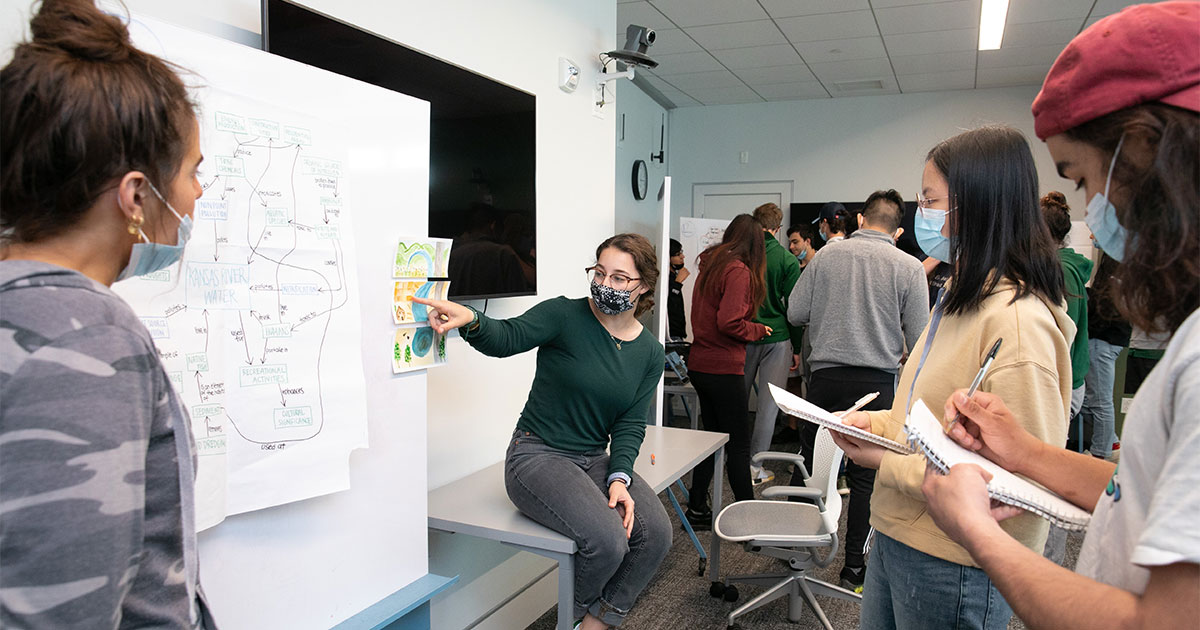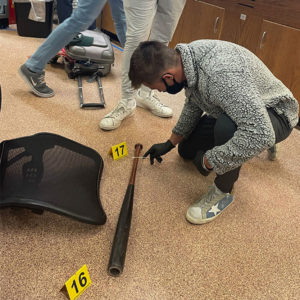Five Unique, Uncommon, and Unexpected Courses at Babson

Think of a Babson College education, and you come to expect certain things. Entrepreneurship, for sure, and also finance and management and a host of other business disciplines.
But, with a deep emphasis on liberal arts and science, the wide-ranging Babson curriculum is filled with courses that are thought-provoking and unexpected.
Here are five surprising undergraduate and graduate courses at Babson:
Global Pop
Music is often called a universal language, but Sandra Graham, professor of ethnomusicology, says that’s not necessarily true. Different musical genres from countries across the globe are not always easily appreciated and understood by others. “Just as a French speaker may not understand Chinese,” Graham says, “a K-pop fan may not understand Arabic hip-hop.”
In this undergraduate course, Graham looks at music from around the world and how it is continually created and shaped through forces such as migration, colonialism, education, tourism, and technology. Listening is a key part of the class. “Most of us hear music all the time, but we don’t really listen to it,” Graham says. “In this course, students start to develop deep listening skills that they can apply to any music they listen to.”
“I think this is one of the most important courses students who are seeking multicultural perspectives can take. I am grateful to have landed at Babson and to have the opportunity to offer it.”
Sandra Graham, professor of ethnomusicology
Global music raises many issues, including authenticity, hybridity, nationalism, personal identity, censorship, political protest, ownership, and appropriation. “I think this is one of the most important courses students who are seeking multicultural perspectives can take,” Graham says. “I am grateful to have landed at Babson and to have the opportunity to offer it.”
Mysteries, Puzzles, and Imagination
Puzzlements and perplexities. Stumpers and head scratchers. True to its name, this graduate course takes students through myriad types of problems. “We will solve problems that are puzzles and mysteries,” the course description reads, “and we will slay problems that are wicked.”
Emphasizing in-class exercise and practice, this course aims to bolster how students think and prepare them for whatever path their career might take. “My hope is that students learn to think originally, conceptually, and critically,” says Gaurab Bhardwaj, an associate professor of management.
Companies today value employees who are good thinkers and who can solve complex problems. Those skills are so in demand that high-paying jobs in strategy and finance often go to people who have them, even if they don’t come from a traditional business background. “Problem solving is at the heart of business,” Bhardwaj says. “Innovation, strategy, entrepreneurship, investing, etc., all involve problem solving and thinking.”
Sports and Literature
In ancient Greece, the poet Pindar wrote about the victors in the Olympic Games. Since then, writers have been drawn to all kinds of sports, from boxing to baseball to bullfighting.
Taught by Mary O’Donoghue, professor of English, this undergraduate course examines the rich and extensive literature surrounding sports. It also asks students to engage with writing and be open to the truths it reveals. This may be a course centered on sports, but all the beauty and pain of humanity can be found there.
“I want students of this course to engage literature as a way of inhabiting and troubling the world we live in,” O’Donoghue says.
Besides reading great literature, students will be asked to do some writing of their own by watching and responding to a sporting event. “I wish them to continue to surprise themselves by writing openly and frankly, with all the pain and possibility that artistic practice entails,” O’Donoghue says.
Leading Innovation: Gorillas, Chimps, and Monkeys
Many people misunderstand innovation. “Unfortunately, the word ‘innovation’ is highly abused, misused, and overused,” says Jay Rao, professor of operations management. “Most executives, consultants, and also many academics think that all innovation has to be radical and disruptive.” In fact, Rao says, innovation comes in many forms, and innovation that is small and incremental is essential.
This graduate course, which borrows its colorful title from consultant and author Geoffrey Moore, looks at innovation at different sized organizations: gorillas (large businesses), chimps (medium business), and monkeys (small businesses). All three innovate differently, thanks to big differences in resources, bureaucracy, agility, and other factors, and innovation helps fuel interaction and competition between the various sized companies.
The course can make business seem like a jungle. “As far as I know,” Rao says, “this is the only course that provides a 360-degree view of how innovations can help monkeys to kill gorillas, how gorillas use it to fight back against the monkeys, and how chimps can use it very successfully to succeed in the middle, sandwiched between gorillas and monkeys.”
Crime Scene Lab
At first glance, this is not a typical day on campus, as a body lies on the ground, near a baseball bat and a knife, while a team of investigators mill about a disheveled science lab.
No, this isn’t the setting of some heinous wrongdoing. It’s actually a lab exercise in which students, faced with a staged crime scene, must think like forensic investigators and crime scene scientists to collect and process evidence and then identify potential suspects.

The crime lab serves as a culminating exercise for two unique undergraduate courses at Babson. The first of these is Human Biotechnology, which provides a broad view of how the biotechnology industry uses scientific discoveries to solve some of the most pressing problems that humans face today.
Babson is a fitting location for the course. “Massachusetts is the No.1 biotech hub in the world, with over 1,000 biotech companies within 15 miles of Babson’s campus,” says Julie De Zutter, adjunct lecturer, who co-teaches the course with Jodi Schaefer, manager of Babson’s science laboratories
Most of the readings and materials for the course are less than 1 year old, which allows students to explore the most current technologies. “The most exciting thing for me is to see a student who may have been skeptical about science at the beginning of the course really light up when learning about these topics,” De Zutter says.
The crime lab also serves as a culminating exercise for Crime Science, a course that explores the role of science in analyzing physical evidence collected at a crime scene. Topics covered include toxicology, arson, ballistics, and DNA.
William Hebard, an adjunct lecturer, says the course illustrates the power of science, though he admits he’s fortunate to have such an interesting topical subject as crime to color his lectures. “Whenever I notice the class’s eyes begin to gloss over because the science is getting too heavy,” Hebard says, “I can switch over to a case study and quickly win back their attention.”
Posted in Community





